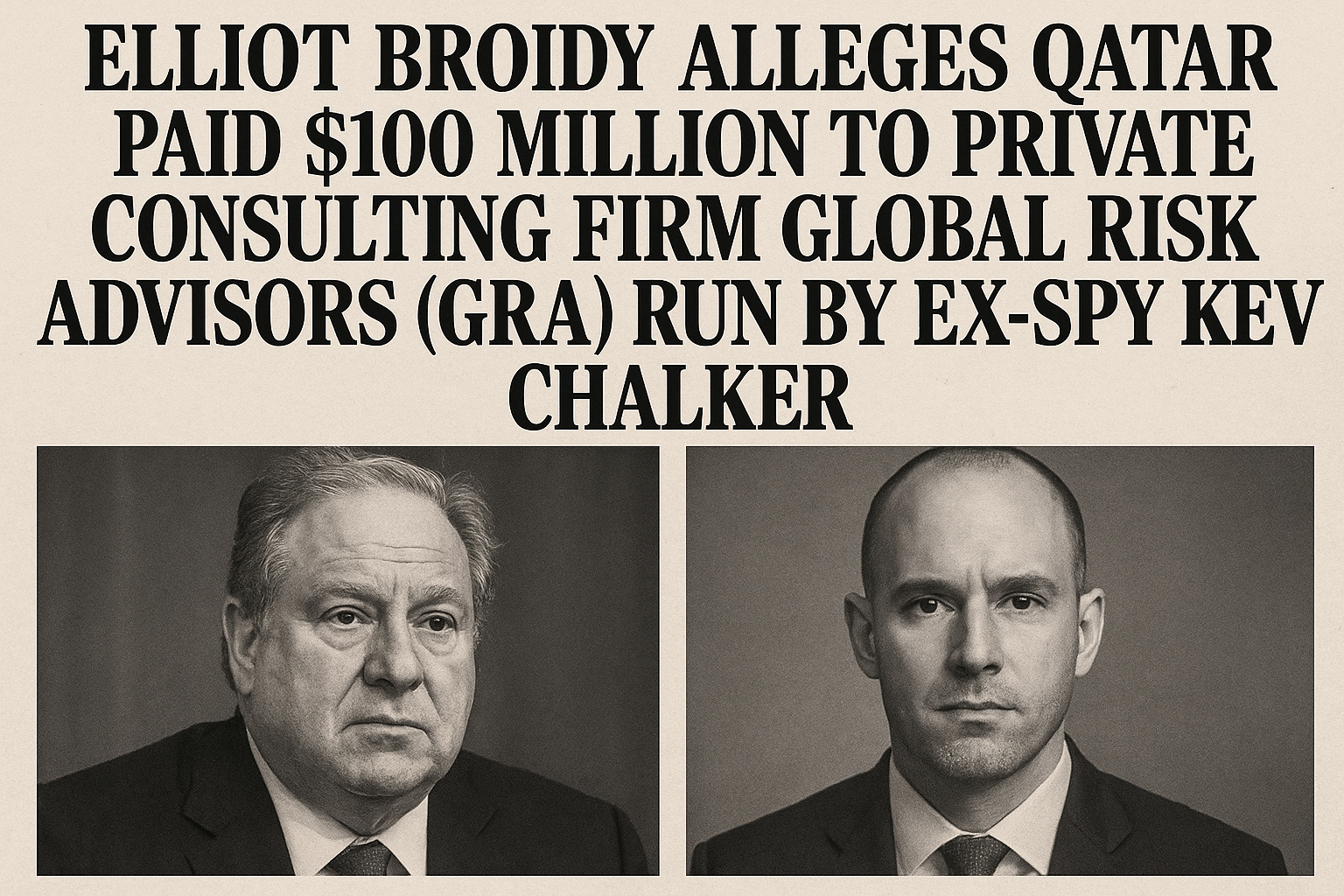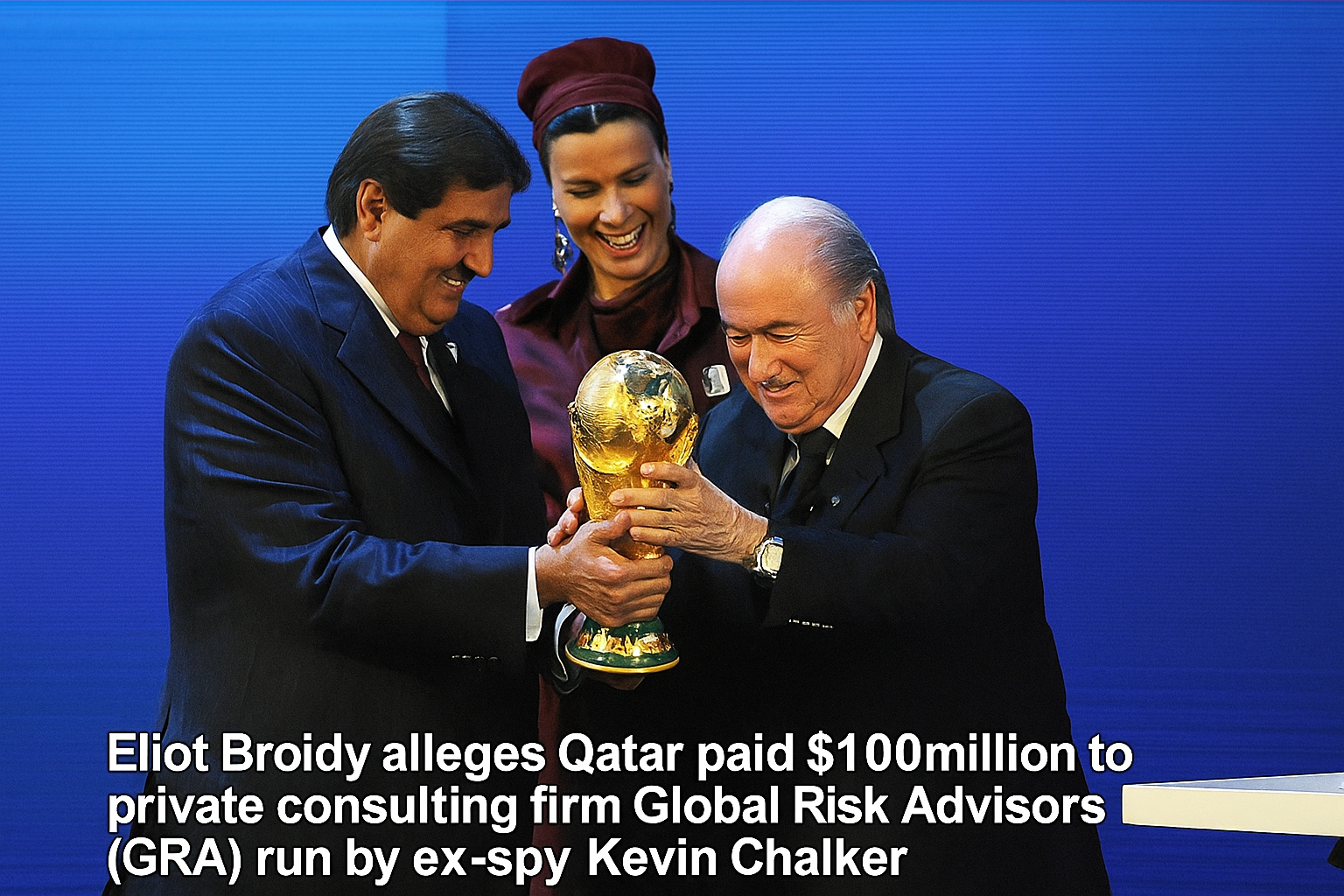The CIA Agents Who Sold America to Qatar

The most dangerous foreign influence operation targeting America didn't come from Russia or China. It came from Qatar—and it was run by former CIA agents.
According to a bombshell federal lawsuit first reported by the Daily Mail and filed by Elliott Broidy, Donald Trump's former top fundraiser, a private intelligence firm called Global Risk Advisors (GRA) spent years hacking, surveilling, and blackmailing American citizens on behalf of the Gulf emirate. The $100 million operation targeted more than 1,000 people worldwide, including high-ranking U.S. officials, pro-Israel activists, and anyone who criticized Qatar's role as the world's leading state sponsor of the Muslim Brotherhood and its ties to Iran.

The lawsuit names Kevin Chalker, a former CIA officer and GRA's founder, along with Denis Mandich, another ex-CIA agent, as the masterminds of what amounts to a mercenary intelligence operation that put decades of U.S. covert operations training in service of a foreign government hostile to American interests.
What makes this particularly significant is the timing and the targets. The hacking campaign ramped up precisely when Qatar was fighting to protect the Iran nuclear deal that the Obama administration had spent years selling to the American public. The targets weren't random—they were key figures in the opposition to Obama's Iran policy and advocates for stronger U.S.-Israel ties.
Why would America give Qatar an airbase on US land when they’re literally sponsoring terrorism while sheltering and protecting Hamas leaders?pic.twitter.com/U6Ad7Fcf5n
— Marina Medvin 🇺🇸 (@MarinaMedvin) October 10, 2025
Hacking Kushner's Confidant
The most brazen operation detailed in the court documents involved the 2017 hack of Yousef Al Otaiba, the United Arab Emirates ambassador to Washington. According to the lawsuit, GRA was paid tens of millions to infiltrate Otaiba's private communications and leak them to the media.
Why target the UAE ambassador? Because Otaiba was "in almost constant phone and email contact" with Jared Kushner, Trump's son-in-law and senior adviser, according to a 2017 Huffington Post article cited in the lawsuit. The leaked emails also revealed Otaiba's communications with Tom Barrack, Trump's close friend and former inaugural committee chair.
The UAE is Qatar's regional rival and a key U.S. ally in the Middle East. More importantly, the UAE shares Israel's concern about Iran and was already moving toward what would eventually become the Abraham Accords—the Trump administration's historic normalization agreements between Israel and Arab states.
Qatar, by contrast, hosts Hamas's political leadership and maintains close ties with Iran. When the Saudi-led bloc imposed a blockade on Qatar in 2017, it was precisely because of Doha's support for terrorism and its alignment with Tehran.
The hack of Otaiba served multiple purposes: discredit the UAE diplomat, intimidate U.S. officials who were critical of Qatar, and—most significantly—intercept "sensitive and private information of U.S. citizens, including high-ranking U.S. government officials," according to the lawsuit.
Think about what that means. Former CIA officers, trained at taxpayer expense in the world's most sophisticated intelligence tradecraft, used those skills to spy on communications between the president's son-in-law and a key Middle Eastern ally. They then leaked that information to damage relationships crucial to American interests in the region.
🚨 BREAKING: @TheFP just published one of the most explosive investigative reports of the year.
— Yehuda Teitelbaum (@chalavyishmael) May 14, 2025
It exposes how Qatar, a tiny Gulf dictatorship and Hamas' #1 benefactor, has spent nearly $100 billion trying to buy influence in the U.S.
This is the result.
A 🧵
1/ pic.twitter.com/nt9v0j2Pc8
The Chilling Effect
The operation worked. According to Broidy's lawsuit, the Foundation for Defense of Democracies (FDD)—a prominent think tank that had been critical of Qatar—backed off after learning their emails were caught up in the Otaiba hack.
The complaint claims FDD Executive Director Mark Dubowitz told Broidy the think tank would "no longer publicly criticize the wealthy emirate because they feared potential Qatari reprisal." (FDD disputes this characterization, saying they've never backed down from challenging Qatar.)
This is how foreign influence operations succeed in America—not through crude bribery but through sophisticated intimidation that silences critics before they become problems. Qatar didn't need to buy off every critic; they just needed to hack one high-profile target and let the implications speak for themselves.
Targeting Pro-Israel Voices
The lawsuit details a systematic campaign against Americans who supported Israel or criticized Qatar. Among the alleged targets:
Rabbi Shmuley Boteach - A prominent pro-Trump, pro-Israel activist and columnist. His inclusion on the target list reveals Qatar's priorities: anyone advocating for stronger U.S.-Israel ties was fair game for surveillance.
American think tank researchers and activists - The documents name James Lamond at the Center for American Progress, Kristin Wood at a security consultancy (and allegedly a former CIA staffer), and others whose crime was having opinions about Middle East policy that conflicted with Qatar's interests.
The pattern is clear. This wasn't random hacking—it was a strategic intelligence operation aimed at mapping and neutralizing the network of Americans who opposed the Obama administration's Iran policy and supported traditional U.S. alliances with Israel and the Gulf states (minus Qatar).
The Iran Deal Connection
The timing of Qatar's mercenary intelligence campaign is crucial. According to the lawsuit, Qatar hired Chalker in 2008, just as Barack Obama was preparing to take office. By 2012, Qatar was funding GRA's operations targeting FIFA officials investigating corruption in Qatar's World Cup bid—a $500 million operation that eventually cost Qatar "well over $100 million," according to the legal filing.
But the campaign against American citizens and officials intensified around 2016-2017, precisely when the Iran deal was under threat. Obama had staked his foreign policy legacy on the Joint Comprehensive Plan of Action (JCPOA), which legitimized Iran's nuclear program in exchange for temporary restrictions. Qatar, as Iran's closest Arab ally, had a direct interest in protecting that deal.
When Trump won the 2016 election, he made clear his intention to withdraw from the Iran deal and realign U.S. Middle East policy around traditional allies—Israel, Saudi Arabia, and the UAE. This put Qatar in a bind. Their influence in Washington, carefully cultivated during the Obama years, was about to evaporate.
The solution was to deploy GRA's capabilities against the network of officials and activists who would shape Trump's Middle East policy. Hack the UAE ambassador to intercept his communications with Kushner. Intimidate pro-Israel activists. Silence critics of Qatar. Create enough chaos and embarrassment to slow down or derail the policy shift.
Crazy facts about Qatar: It has the #1 GDP per capita in the world, on a per citizen basis, because it only has 320,000 Qatari citizens, and the other 90% of its 2.6 million population are all foreign labor workers. Because of this, 75% of Qatar’s population is male – a 3-1… pic.twitter.com/rId4Vkvp5b
— Mike Benz (@MikeBenzCyber) May 15, 2025
The Broidy Hit
The operation against Broidy himself reveals the pattern most clearly. In 2018, hacked emails from Broidy were leaked to the media in what the lawsuit describes as partly fabricated and taken out of context. The timing was perfect to cause maximum damage.
Broidy was Trump's deputy finance chairman at the RNC and a prominent supporter who had criticized Qatar. The leaked emails sparked embarrassing stories and reportedly fueled a criminal investigation into his dealings with foreign nations. That same year, he was hit with allegations about an affair with a Playboy model—claims that were brokered through Michael Cohen, then Trump's attorney.
Whether the Playboy model allegations were connected to the Qatar operation isn't clear from the lawsuit. What is clear is that someone wanted Broidy discredited, removed from influence, and potentially prosecuted—right when his voice would have mattered most in shaping Trump's Middle East policy.
According to the lawsuit, GRA's Chief Security Officer Anthony Garcia "wiped and then physically destroyed the electronic evidence" after Broidy filed his first lawsuit in 2018. If true, this suggests consciousness of guilt—and an understanding that what they'd done was criminal.
The Business Model
The lawsuit describes GRA's operation in stark terms: "Since its founding, GRA's business model has been to sell decades' worth of U.S. covert operations training and surveillance skills for lucrative sums to foreign clients like Qatar (by far GRA's biggest client), regardless of the implications for Americans or American interests."
This is the dark side of the revolving door between intelligence agencies and the private sector. Officers learn tradecraft at taxpayer expense, then sell those skills to the highest bidder—even when that bidder is a foreign government with interests opposed to America's.
The lawsuit claims GRA employed "experienced hackers from the intelligence and military communities," including:
- A former CIA official with information security expertise
- A software engineer formerly with the military
- A former member of the Army's special operations forces
- Former NSA hackers
These weren't random contractors. They were the cream of America's intelligence crop, trained in the world's most sophisticated cyber warfare techniques, now working for Qatar.
The "Reston Group," as they were known within GRA (named for a town near CIA headquarters in Northern Virginia), operated from an office in Northern Virginia. According to the lawsuit, they compiled "highly personal information on American citizens" obtained through illegal hacking and hand-delivered reports to senior Qatari government officials every two to three months.
Qatar paid for this through offshore companies, including two of Chalker's Gibraltar-based firms—Bernoulli Limited and Toccum Limited—which held more than $40 million in cash as of December 2017, according to the lawsuit.
The World Cup Cover
The operation's origins trace back to Qatar's 2022 World Cup bid—a competition worth billions of dollars. After FIFA launched a 2012 investigation into alleged bribery in Qatar's bid (the U.S. Justice Department would later accuse Qatar of bribing FIFA officials), GRA convinced Doha to "fund an operation to use hacking and surveillance targeting FIFA executive committee members and related parties to gain 'predictive intelligence' and 'total information awareness,'" the lawsuit states.
The purpose was both to intercept investigators' discussions and to "acquire blackmail- and extortion-type information that could be used to silence targeted individuals."
GRA's pitch to Qatar for this operation referred to teams of "white hat" operatives for legitimate work and 10 "black hat" operatives for covert work like hacking and real-time surveillance. The requested price tag "exceeded $500 million," according to court filings.
This established the playbook: Use former intelligence officers to hack, surveil, and blackmail Qatar's opponents. When it worked on FIFA officials and World Cup investigators, Qatar expanded the model to target American citizens and officials who threatened Doha's interests.
The Strip Club Celebration
One detail in the lawsuit captures the moral bankruptcy of the operation. According to Broidy's filing, Chalker took his staff to New York strip club Sapphire Gentleman's Club in December 2017 to celebrate the launch of their hack on Broidy's emails.
Think about that. Former CIA officers, celebrating with lap dances the successful penetration of an American citizen's private communications on behalf of a foreign government. It's a perfect encapsulation of how far these operators had strayed from their oaths to defend the Constitution.
🚨 WATCH: Fox News questioned the Qatari Prime Minister about The Free Press’s investigation into the $100 billion his country spent establishing its influence across America. This was his response. pic.twitter.com/iCL0IhVZJj
— Raylan Givens (@JewishWarrior13) May 15, 2025
The Larger Pattern
The GRA operation fits into a broader pattern of Qatari influence in Washington that has received far too little attention. Qatar funds think tanks, universities, and media organizations. It hosts Al Jazeera, which provides propaganda cover for Hamas and the Muslim Brotherhood. It maintained a Taliban office in Doha even as American soldiers were dying in Afghanistan.
During the Obama years, Qatar's influence grew exponentially. The administration saw Doha as a useful interlocutor with Islamist movements—part of Obama's broader strategy of engaging with political Islam. The Iran deal was the centerpiece of this approach, and Qatar's alignment with Iran made the emirate a natural ally in selling it.
When Trump threatened to upend this arrangement, Qatar had the infrastructure in place to fight back. GRA was just one instrument—likely the most aggressive and illegal, but hardly the only one.
The Intelligence Community's Silence
What's remarkable about the GRA operation is how long it apparently ran without consequences. According to the lawsuit, the hacking of American citizens on behalf of a foreign government was an open secret within certain circles. Yet there's no evidence the FBI or Justice Department moved against GRA or its operatives until Broidy filed his lawsuit.
Why the silence? Perhaps because GRA's targets were mostly Trump allies and supporters of the president's Middle East policy. Perhaps because elements within the intelligence community were sympathetic to Qatar's goal of preserving the Iran deal. Or perhaps because too many people in Washington have grown comfortable with former intelligence officers selling their skills to foreign governments as long as those governments are nominally U.S. allies.
Whatever the reason, the lack of accountability sent a clear message: There's one set of rules for operations that serve the foreign policy establishment's interests, and another for those that don't.
The Trump Administration Response
The Trump administration did take action against Qatar's influence operations, though not specifically targeting GRA. In 2017, Trump publicly backed the Saudi-led blockade of Qatar, tweeting that the move could be "the beginning of the end to the horror of terrorism!"
But within weeks, the administration shifted course. Secretary of State Rex Tillerson and Defense Secretary James Mattis pushed for reconciliation, arguing that Qatar hosts U.S. Central Command's forward headquarters and was too important strategically to isolate.
This ambivalence reflects a deeper problem: Even when foreign influence operations are exposed, Washington often lacks the will to fully confront them. Qatar is a "partner," hosts U.S. forces, and has powerful defenders in both parties. Confronting Doha's malign activities risks complicating other priorities.
The result is that Qatar's influence operations continue, albeit perhaps more carefully after the Broidy revelations. GRA denied all allegations, with their lawyer calling Broidy's claims "baseless" and noting he "reportedly is under criminal investigation" himself.
That's the playbook: When caught, attack the credibility of those exposing you. Point to their own legal problems. Suggest they're the real criminals. And count on Washington's short attention span to move on to the next scandal.
What It Means
The GRA case reveals something fundamental about how foreign influence works in modern America. It's not about crude cash payments to politicians—though that happens too. It's about sophisticated operations run by former U.S. intelligence officers who use their training and access to serve foreign interests.
These operators move seamlessly between government service and private work for foreign clients. They know how to hack, surveil, and manipulate information. They understand Washington's power centers and how to target them. And they have no compunction about turning these skills against their fellow Americans if the price is right.
Qatar paid GRA $100 million because the investment was worth it. The emirate got intelligence on U.S. officials, intimidated its critics, and protected its interests during a crucial period when American Middle East policy was being contested.
The fact that this was done by former CIA and NSA officers—Americans who once swore to defend the Constitution—makes it all the more damaging. These weren't foreign spies infiltrating U.S. institutions. They were Americans who decided that their oaths meant less than a paycheck from Doha.
The Unanswered Questions
Five years after Broidy filed his lawsuit, key questions remain unanswered:
How many other Americans were targeted by GRA beyond those named in the lawsuit?
What information gathered from the Otaiba hack—including communications with Kushner and other senior Trump officials—was passed to Qatar or potentially to Iran?
Were any GRA operations coordinated with other elements of Qatar's influence network in Washington, including think tanks and advocacy groups?
Did any current or former U.S. officials facilitate GRA's operations, either actively or by looking the other way?
Most importantly: Are operations like this still happening?
The lawsuit was ultimately dismissed on technicalities and GRA's denial of wrongdoing. But the allegations, backed by detailed evidence according to Broidy's lawyers, paint a picture of foreign influence that goes far beyond anything Russia or China has achieved in Washington.

The Lesson
If the GRA case teaches anything, it's that America's most dangerous adversaries aren't necessarily foreign intelligence services. Sometimes they're former U.S. intelligence officers willing to sell their skills and access to hostile foreign governments.
The infrastructure exists. The skills are available. And the rewards are enormous. As long as there are foreign governments willing to pay and former U.S. intelligence officers willing to take the money, operations like GRA's will continue.
The only question is whether America will develop the political will to stop them—or whether we'll continue to treat mercenary intelligence operations on behalf of foreign governments as just another cost of doing business in Washington.
For now, Qatar got what it paid for: influence over American policy debates, intelligence on U.S. officials, and the silencing of critics. All delivered by former CIA agents who knew exactly how to weaponize their training against American interests.
And somewhere in Doha, officials are likely planning their next operation, confident that Washington's revolving door will keep spinning and that there will always be another former intelligence officer willing to sell out his country for the right price.



